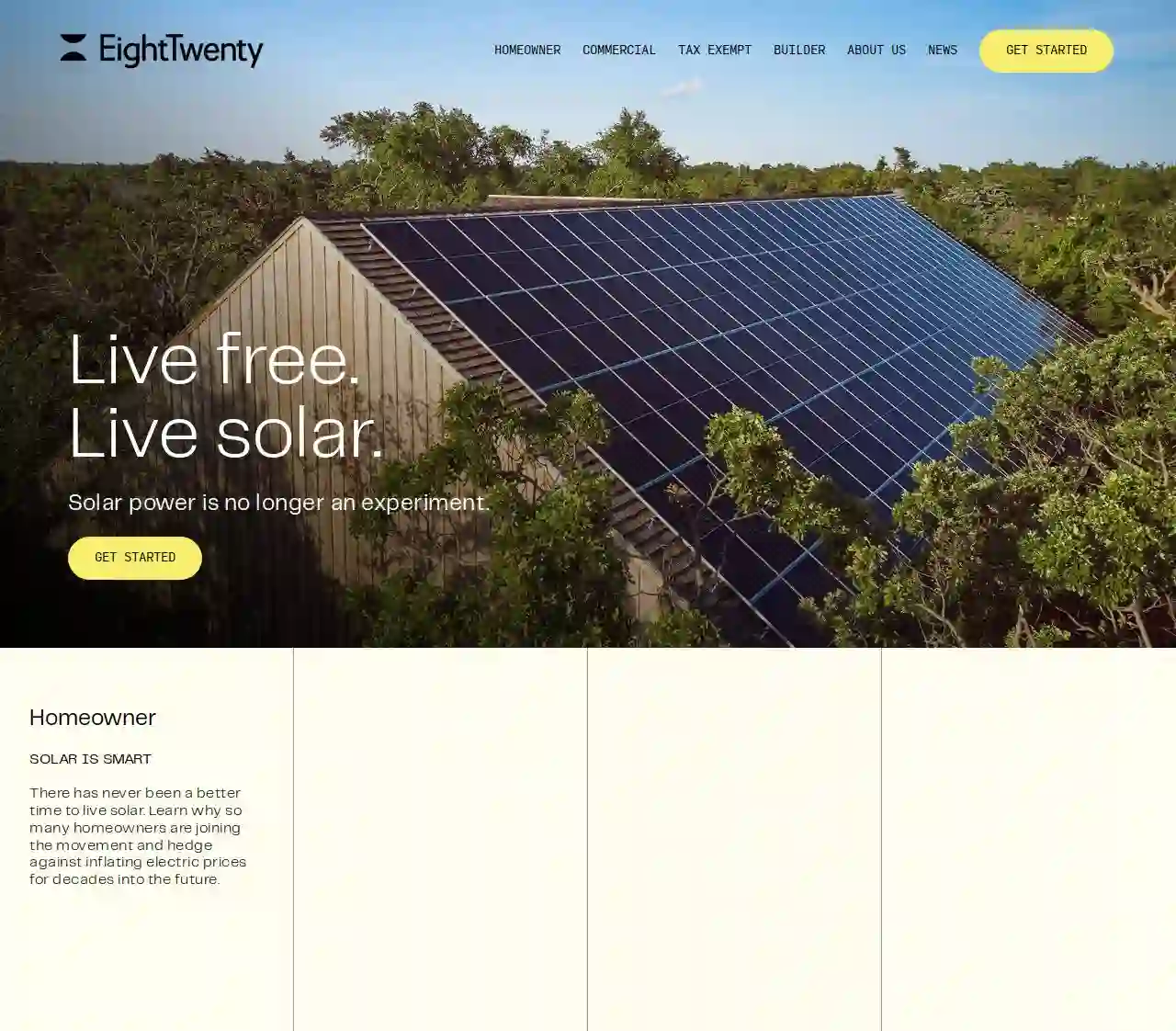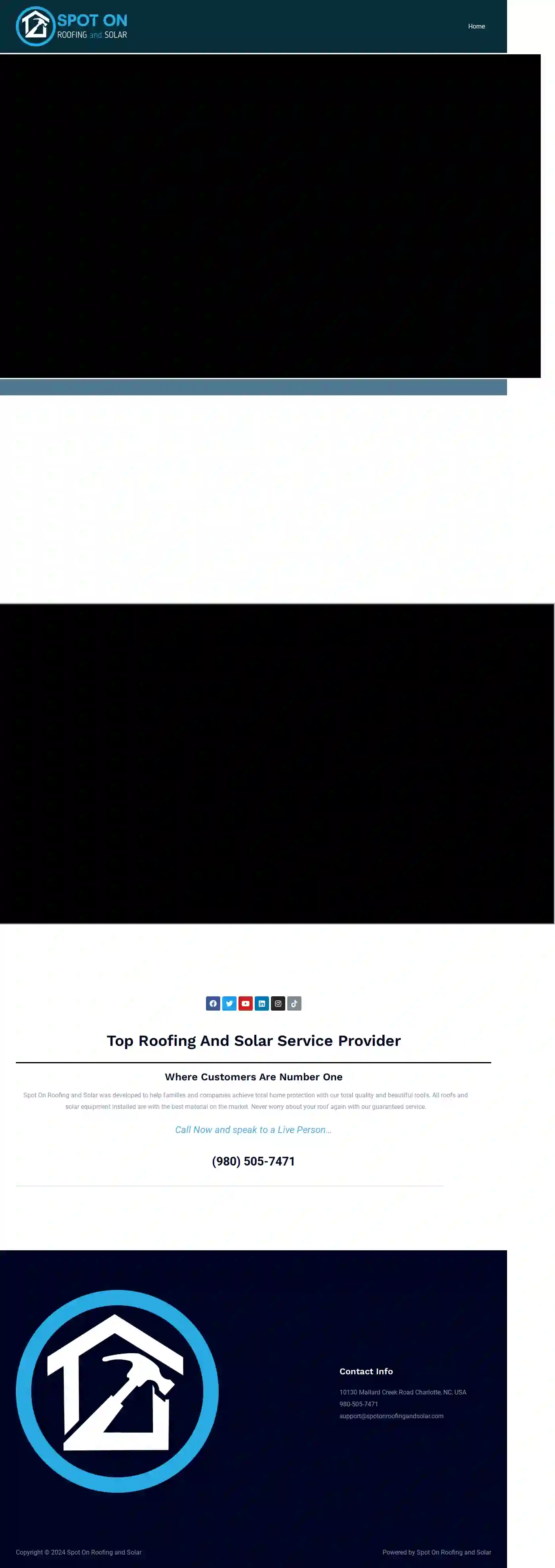Solar Installers Stokesdale
Top 10 Solar Energy Company in Stokesdale
Receive up to 3 Solar Contractors quotes for your project today! Compare profiles, reviews, accreditations, portfolio, etc... and choose the best deal.

Carolina Mountain Solar
513 reviews114 Depot Street, Murphy, 28906, USCarolina Mountain Solar specializes in designing and building turn-key commercial solar panel systems for businesses in North Carolina and Georgia. With a focus on providing a 7% to 20%+ annual return on investment, the company aims to help businesses save money on their monthly electric bills. Carolina Mountain Solar is owned by NABCEP Certified PV Professional Stewart Senger and holds unlimited master electrical licenses in both North Carolina and Georgia.
- Services
- Why Us?
- Accreditations
- Our Team
- Gallery
Get Quote
Nova Solar
615 River Highway #1021, Mooresville, 28117, USNova Solar is a solar energy solutions provider that helps homeowners and businesses find the best solar products, warranties, finance options, and installers available to them. They offer premium solar and electrical equipment, ensuring quality in their work and customer service. Nova Solar aims to provide clean renewable energy, lower monthly bills, energy independence, and huge government tax incentives.
- Services
- Why Us?
- Gallery
Get Quote
EightTwenty
4.857 reviewsSuite 100, Beverly Hills, 123 Solar Way, 90210, USLive free. Live solar. Solar power is no longer an experiment. Get Started. Homeowner. SOLAR IS SMART. There has never been a better time to live solar. Learn why so many homeowners are joining the movement and hedge against inflating electric prices for decades into the future. Get Started. Commercial. SOLAR MAKES SENSE. Sustainability is no longer a movement of a few. Recent legislation created huge tax incentives for forward-thinking business owners and landlords that want to power their projects with clean, renewable energy. Power Your Business. Tax-Exempt. SOLAR IS AFFORDABLE. With the passing of the Inflation Reduction Act, it is a new day for all tax-exempt institutions wanting to go solar. Your stakeholders and your budget are ready for it. Learn how to receive a direct payment of 30% of your project cost. Schedule a call. Builder. SOLAR IS THE FUTURE. We have entered into the solar decade and are forming partnerships with companies that want to join us on the journey. Learn how to integrate solar, storage, and EV charging into your projects, enhance your brand and be future-ready for your customers. Book a Meeting. Why Live Solar? Quit Overspending. Your electric bill will likely triple over the warrantied life of your solar panels. If you choose to live life without solar, you will be paying the utility companies 300% more than you need to. Doing nothing will cost much more than going solar. Lock in your electric energy costs and limit your carbon footprint today. Lock in now. EightTwenty is WHO WE ARE. RECENT PROJECTS. Trusted. Empowering. Local. In Your Community. Your Neighbor. We exist to create raving fans. Hear our customer and partner testimonials. It’s easier than you think to.
- Services
- Why Us?
- Accreditations
- Our Team
- Testimonials
- Gallery
Get Quote
Solar Cellz USA
56 reviewsSolarCity, CA, 123 Solar Street, Los Angeles, 90210, USSolar Cellz USA is one of the largest solar panel distributors in the United States. We supply solar installers and contractors with solar energy equipment, engineering services, and project finance solutions. We offer top-of-the-line customer service and state-of-the-art products for all types of installations from residential to commercial. Creating a world sustained by clean energy requires education, transparency, and trust. At SolarCellz USA, we invest in business solutions to reduce customer risk and the partner education that empowers their decision making. We’re building smarter customers and a smarter marketplace.
- Services
- Why Us?
- Accreditations
- Our Team
- Testimonials
- Gallery
Get Quote
Southeast SolarPros
530 reviewsSoutheast SolarPros, 123 Solar Lane, Irmo, SC, 29063, USSoutheast SolarPros is a professional solar panel company serving homeowners and businesses in the Carolinas. We pride ourselves in our high quality, engineered solar energy systems and solar panel installations. Go green with our sustainable energy solutions today.
- Services
- Why Us?
- Accreditations
- Our Team
- Testimonials
- Gallery
Get Quote
Solar Energy Labs
4.632 reviews123 Solar Way, Suite 100, Jacksonville, 32207, USSolar Energy Labs is a full-service solar contractor in Jacksonville, Florida, providing long-lasting solar panels and battery backup systems for over 40 years. They offer a 26% tax credit after installation and a 25-year panel guarantee. Their systems are made in the USA to meet US codes and can withstand harsh hurricane seasons. They serve Jacksonville, Nocatee, Orange Park, Green Cove Springs, Fernandina Beach, St. Johns, Amelia Island, Palatka, Fleming Island, Ponte Vedra, and surrounding areas.
- Services
- Why Us?
- Accreditations
- Our Team
- Testimonials
- Gallery
Get Quote
Spot On Roofing and Solar
514 reviews10130 Mallard Creek Road, Charlotte, NC, USA, 28262, USSpot On Roofing and Solar was developed to help families and companies achieve total home protection with our total quality and beautiful roofs. All roofs and solar equipment installed are with the best material on the market. Never worry about your roof again with our guaranteed service.
- Services
- Why Us?
- Accreditations
- Our Team
- Testimonials
- Gallery
Get Quote
Solar Panels OKC
51 reviewsOklahoma City, OK, 7116 NW 146th st, 73142, USSolar Panels OKC is a leading provider of solar energy solutions in Oklahoma City. We offer a range of services including residential, commercial, and roofing solutions. Our team is dedicated to helping homeowners and businesses transition to clean energy, reducing utility costs and supporting a healthier planet. We provide deep insights into the latest in solar technology, ensuring our clients receive the most efficient solar energy solutions available.
- Services
- Why Us?
- Accreditations
- Our Team
- Testimonials
- Gallery
Get Quote
Carolina Solar Security
4.936 reviews310 N. Front Street, Wilmington, 28401, USCarolina Solar Security is the area’s largest and most experienced 3M™ authorized dealer and applicator of high-performance window film. We also offer commercial graphics that drive leads and boost business.
- Services
- Why Us?
- Accreditations
- Gallery
Get Quote
Artic Solar, Inc. - Industrial Solar Thermal Solutions
1057 Ellis Rd N #17, Jacksonville, 32254, USArtic Solar, Inc. is a certified Veteran-Owned Small Business capable of providing Solar Energy Solutions. They specialize in advanced solar thermal technology, offering temperatures up to 400°F with no moving parts. Their technology is designed to inject heat into existing systems, eliminating the need for costly tracking systems and reducing O&M costs. Artic Solar serves various industries including mining, government, hospitals, and more, providing solutions for process heat, air conditioning, refrigeration, dehumidification, and electric power generation.
- Services
- Why Us?
- Accreditations
- Gallery
Get Quote
Over 4,210+ Solar Installers onboarded
Our solar providers operate in Stokesdale and surroundings!
SolarCompaniesHub has curated and vetted Top Solar Installers arround Stokesdale. Find a reliable contractor today.
Frequently Asked Questions About Solar Installers
- Contact SolarCompaniesHub: We make it simple to connect with reputable Solar Installers in your area.
- Get Free Quotes: Request free quotes from multiple installers to compare prices, systems, and warranties.
- Schedule a Site Assessment: A qualified installer will visit your property to assess your roof, energy needs, and discuss your goals.
- Review Your Proposal and Contract: Carefully review the proposed system, financing options, and warranties before signing a contract.
- Installation and Activation: Once the contract is signed, the installer will obtain necessary permits, schedule the installation, and activate your solar system.
Do solar panels increase my home value?
How do I get started with solar panel installation?
What happens if my roof needs to be replaced after I install solar panels?
What is the lifespan of solar panels?
Do solar panels increase my home value?
How do I get started with solar panel installation?
- Contact SolarCompaniesHub: We make it simple to connect with reputable Solar Installers in your area.
- Get Free Quotes: Request free quotes from multiple installers to compare prices, systems, and warranties.
- Schedule a Site Assessment: A qualified installer will visit your property to assess your roof, energy needs, and discuss your goals.
- Review Your Proposal and Contract: Carefully review the proposed system, financing options, and warranties before signing a contract.
- Installation and Activation: Once the contract is signed, the installer will obtain necessary permits, schedule the installation, and activate your solar system.